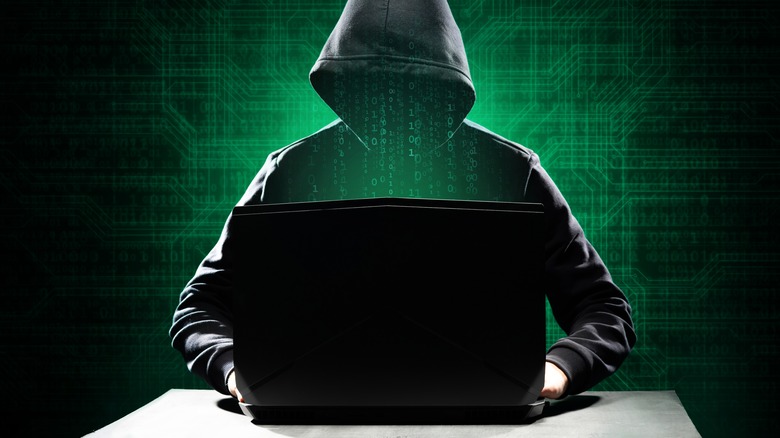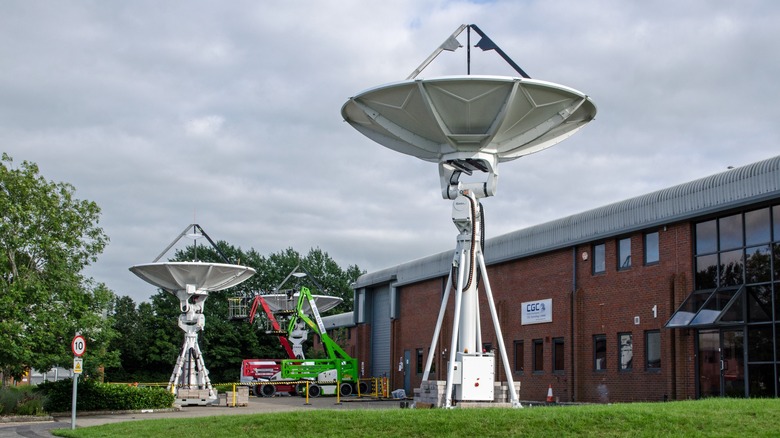Hijacking Satellites Is Easier Than You'd Think
Hacking a satellite and using it to send out a nationwide broadcast sounds like a plan ripped straight from a spy thriller — but it's actually something you can do in your spare time. You may also think the equipment involved is locked in a vault beneath the Pentagon, but you only need around $300 and access to an uplink station. So for less than the price of a Meta Quest 2, you can hijack one of the many disused satellites whizzing around the rock we live on and relay your demands to the world's governments.
During this year's annual DefCon hacker convention, Karl Koscher, a member of the white hat hacking group ShadyTel, recently did just that. Koscher managed to hack into a disused Canadian broadcast satellite and used it to broadcast a variety of content. The broadcast included talks from last year's ToorCon, which is a San Diego-based hacking conference, and a variety of hacking-themed movies like "WarGames." If he wanted, Koscher could also broadcast his voice over the satellite by tying it to a phone conference bridge.
Speaking to Motherboard, the hacker explained what motivated him to make the broadcast. Koscher said: "What do you do with a satellite? What does a hacker do with a satellite? You have some fun with it. We had an opportunity to use a satellite that was being decommissioned. We also had the ability to put our own content on there." Koscher took the legal route to both performing the hack and transmitting the broadcast. With the right know-how and equipment, the whole thing seems quite straightforward and involves exploiting glaring security flaws in the satellite themselves. These security issues exist despite the fact the hackers targeting satellites aren't always ethical.
You can legally hack a satellite
Hacking is actually a broad topic. Despite what stock photos of people hunched over in hoodies may have you believe, there is actually a very large ethical hacking community. Some ethical hackers probe for holes in software in an attempt to find exploits and inform a developer about them before one of the bad guys does. Some of them do it for fun, either in private, in small groups, or at gatherings known as hackathons. Others make a living that way. Tech companies like Google often offer very large bounties to hackers who can crack its software. Then you have the illegal stuff, which is also a big money maker but one that may land you in federal prison for the rest of your days if you get caught.
As for hacking satellites specifically — that can also be legal if you tick the correct boxes first. Even after they're decommissioned, satellites are still someone's property. If the owner discovers what you've done, you could land in legal trouble. Then there's the whole list of regulations that come with satellite operation and use. So even if the satellite's owner doesn't care, you can still find yourself falling foul of the FCC.
The hack performed by Koscher was entirely legal. Before it was performed, a lease was acquired for the satellite's transponder, which is the part that manages what information the satellite is sending and receiving. Koscher also acquired a license so he could use the abandoned uplink station selected for the task without falling afoul of authorities. If you too want to legally hijack a satellite, there will be a similar amount of paperwork and a few fees involved. But once that's out of the way, things may actually get less complex.
How do you hack into something orbiting Earth?
When it comes to the actual hacking part, the first thing you'll need is an uplink station, which is what sends signals out to satellites in the first place. Tech Target says that uplink stations can be rented out, which is something a lot of TV stations do. Koscher acquired a license and then used an abandoned uplink station for his hack, which is presumably the cheaper option. And, theoretically, you can build your own, though it is probably a lot more complex than a simple arts and crafts project. Once your uplink station is sorted, you're only one $300 piece of equipment away from completing your satellite hacking setup. You'll need something called a Hack RF, which contains all of the hardware and software you need to get into the satellite itself.
As Koscher explains to Motherboard, once you have the right tools, the appalling lack of security on satellites makes it easy to take one over. He says, "Satellites basically just reflect whatever signal is sent up to them. There's no authentication or anything. If you're loud enough, and if there's another user on that transponder, you have to shout louder than them. But if there's no one there, will just repeat it."
The option Koscher took involved targeting an unused satellite that was making its way toward its final resting place. As NASA explains, the satellites that are too big to burn up on reentry are either crashed into the Pacific Ocean or simply sent too far away to bother anyone. As the former CBC satellite was at the end of its life and no longer being used, the hackers didn't need a particularly strong signal to get a result. However, it is possible to hijack an active satellite.
This isn't the first satellite to get hacked
Satellites have been hacked before, and the people responsible haven't always bothered to go through the legal formalities first. Back in the 1980s, HBO viewers who planned on settling down to an evening's entertainment with a bowl of popcorn were instead treated to a message from Captain Midnight, a hacker who had hijacked the broadcast. According to The New York Times, in place of ”The Falcon and The Snowman" was a message printed on the channel's test card that read, "Goodevening HBO from Captain Midnight. $12.95 a month? No way! (Showtime-Movie Channel Beware.)”
HBO's east coast broadcasts were interrupted by the hack, and its Vice President at the time, David Pritchard, made claims his company had been threatened with sabotage in the months leading up to the incident. Pritchard also described the hack as ”a criminal, willful interference of a government-licensed satellite broadcast." Captain Midnight was eventually caught and unmasked as John MacDougall, an electrical engineer and satellite dish-based business owner who was upset about HBO adding a monthly fee for its services. McDougall pled guilty to a misdemeanor and received a $5,000 fine for the stunt.
The problem could also be much worse than a movie getting interrupted for five minutes. As The Washington Post reports, Congress is becoming increasingly concerned about the dangers posed by satellite hackers. As well as interrupting communications, a hacker could theoretically orchestrate an attack that causes two satellites to hit one another or collide with the International Space Station. The U.S. government has also previously expressed concern about rival nations like China directly targeting its government and military satellites.



